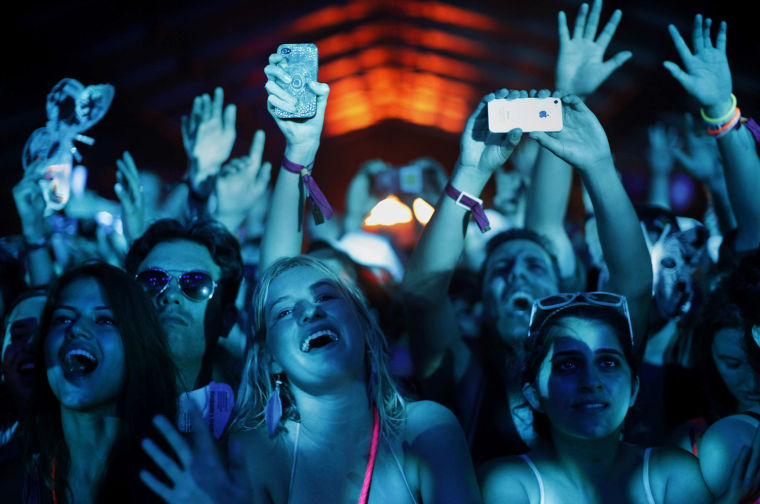Molly Wars: how Magnetic Magazine misses the point
October 9, 2013
The Internet is good at coining ridiculous terms. Take “chillwave,” for example. It’s believed that an obscure blogger, after drowning in the chill vibes of Toro y Moi’s Causers of This, came up with the term that maligned an entire movement.
Magnetic magazine, an electronic dance music (EDM) magazine, might have been the first to use the phrase Molly Wars. The term refers to the long-overdue discussion about the abuse of the drug MDMA (commonly called “molly”) at electronic music festivals.
It’s safe to say that the folks over at Magnetic are all about defending EDM from the haters — fist pumping uncontrollably and fighting off the “culture’s” detractors with rays of good vibes, man. They even took shots at The Pitt News’ own Brett Dresner in the thoughtfully titled piece “Pitt News’ Brett Dresner Wants To Eliminate EDM Culture — Magnetic Responds,” referring to an Oct. 6 opinions piece discouraging attendance at EDM festivals to prevent use of the drug Ecstasy.
Yosh, the article’s author, says Dresner’s piece does more harm than good because it relies on stereotypes about EDM culture, and because we should teach people how to do drugs. He says that despite his writing about EDM full-time, no one can truly understand the culture. I get it — I’ve seen Dom Mazzetti on dubstep.
What’s problematic about a full-time EDM blogger taking shots at a college newspaper’s opinions page because he has a Google news alert set for the term “EDM” is that it truly does obscure the discussion. There can only be a Molly War if someone is defending it, and no matter your views on drug policy, no one should be defending drug abuse.
The worst part of these Molly Wars, and the reason I’m disgusted that Magnetic magazine decided to publish this article, is the pernicious nature of EDM festival heavyweights’ comments in light of the recent deaths at festivals.
It all feels like the NRA coming out after Sandy Hook. Diplo, who’s worth $15 million from selling the music that’s popular at these festivals, talked to Rolling Stone about drug use following the deaths at the Electric Zoo EDM festival in New York.
“We’d rather ignore it to solve the problem. In Florida, where I’m from, drugs have been a part of club culture since day one. Kids have always been going to raves in the woods. Twenty years ago, Orlando was one of the first places to have rave culture, and we learned how to do drugs. It’s going to happen; you can’t control it. Persecuting a festival is not going to help it, because kids are going to do them, regardless. Hell, they’ll do them in their houses. That’s why crystal meth is a problem in America. Drugs are a big problem in America, because we have money to spend and a culture that wants to be turned up all the time.” Diplo said.
That last sentence is important and sort of detrimental to Diplo’s ultimate point. If we all just stopped turning up so much Diplo would be out of work. But the scarier part of it is the truth to it — we do like to be turned up all the time, and no one really seems to care why. In Dresner’s article, he points to society’s ills as a common impetus for drug abuse, arguing that in EDM’s case, excess is the culture.
Yosh took issue with this, saying EDM started in black, Hispanic and homosexual cultures. I’m black, but I don’t think I was at the meeting where all the minority groups met up to make music together — darn. Nonetheless, it’s an interesting point. The crack epidemic has an obvious genesis in Reagan-era cuts to social welfare programs that devastated low-income and predominately black parts of the country.
In that case, society messed up pretty majorly. However, as it currently stands, EDM culture is perhaps the opposite. Festival attendees are overwhelmingly homogeneous: white and upper-middle class. The only societal ill faced here is boredom.
But alas, Magnetic magazine isn’t just an EDM blog; they’ve got a handle on psychology, as well. In another wonderfully titled piece, “EDM Culture: It’s Time To Talk About Drugs,” Hanna DeuPree has the answers.
“Why are we not able to stop the ingestion of drugs? Because it is human nature. As a race, we constantly seek happiness, pleasure and gratification. Look back to the late 1800s when the Freudian pleasure principle was introduced to society,” she said, adding that, “Of course, not everyone agrees with finding gratification or happiness in stimulants, but most recreational users will agree that it is the easiest, fastest way to leaving reality and embarking on an adventure through a self-induced wonderland.”
If the claim that our human nature makes us blindly seek pleasure — no matter what the cost — sounds familiar, it’s because it has been used as a cop-out time and time again for some of our culture’s biggest problems.
The bottom line is this: EDM is really popular, and a lot of people are making a lot of money from it — you can even be a full-time EDM blogger. And just like the gun business, the dangers associated with festivals are harmful to the bottom line. It’s not about American drug policy — which certainly needs some amending, seeing as EDM’s founding races are facing the brunt of the burden. It’s about American greed.








